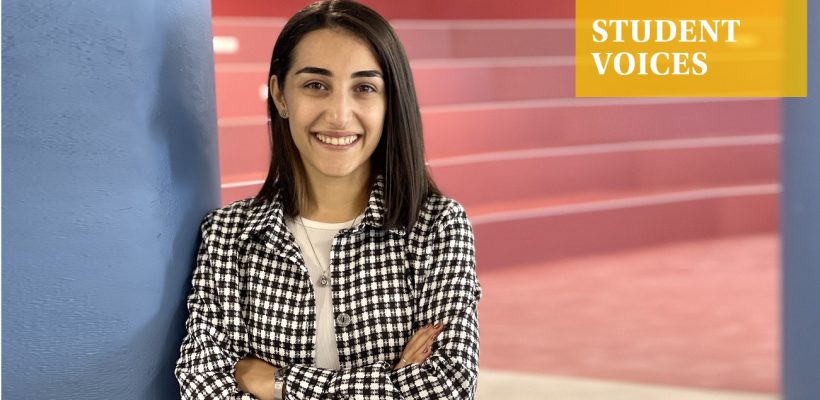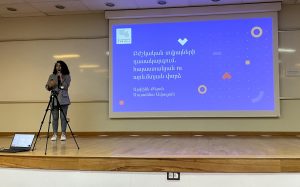
A Path to Making Data-Driven Decisions
5 min readContributed by Susanna Avagyan (BSDS ‘22)
On the Intersection of Biology and Data Science
I have always been interested in human biology and was specifically passionate about genetics. When I was a senior in high school, I was getting ready to apply to the Medical University because it seemed like the place where I could satisfy my curiosity. But then I heard that AUA was opening a Bioinformatics program (later Data Science with a bioinformatics track). At that point, I didn’t know what bioinformatics was.
I have always loved math and informatics, and at that time, I started to get interested in data science because it looked very promising and exciting to me. So with research on bioinformatics, I was able to see that this was a multidisciplinary field where my passion for biology would meet my burgeoning interest in data science. It was the first undergraduate degree program in data science to be offered in Armenia. So I was in the right place, at the right time, and within days, putting aside my exam preparatory materials for medical school, I started filling out my application for admission to AUA.
Entering AUA was a big dream come true. I knew that my experience here would be so different from the years I spent in school and the exposure I could have in other universities in Armenia. And I was right. During my four years at AUA, I have expanded my network, acquired so much knowledge and skills that help me every day in academic, professional, as well as personal matters.
My Journey at AUA
From an academic point of view, the courses in my major gave me a solid knowledge base in mathematics, programming, and data analytics. In the Data Science program, I got to meet and learn from so many professors who are committed to excellence in their fields. With them, we get to practice what we learn, transforming the knowledge gained into an actual skill set that we can use in solving real-life problems.
Moreover, AUA faculty don’t only provide academic knowledge but also exemplify self-discipline. In practice, we learn the importance of integrity, responsibility, and effective communication. We are not simply taught subject matter; we are taught how to acquire knowledge. And this is a crucial skill for a world where you constantly need to self-learn not to stay behind and be successful. The culture in AUA classrooms helps the students gain essential soft skills. Having the opportunity to design a multidisciplinary study plan for myself, I got to learn about different things ranging from arts and humanities to social sciences. And if math courses did not require me to make a lot of presentations, engage in public speaking, practice my communication skills, teamwork, leadership, I had the chance to practice those in many other classes.
Outside the classroom, I have tried to be an active student and contribute to making the community a better place. I have been a Student Ambassador, a Peer Mentor; now, I am a Student Club Leader (Data Warriors Data Science Club). And these opportunities also add up to my great experience at AUA.
And finally, I got to make a lot of new connections and friendships with professors, other staff and faculty members, classmates, which I consider an equally significant achievement in my undergraduate years along with what I stated above.
All this became possible thanks to the fact that AUA offers equal opportunities to people wanting to learn and grow so that nothing can stand between you and your goal of getting a good education and becoming successful.
Exploring Career Opportunities in Bioinformatics
I work as a Data Scientist at Sololearn, a U.S.-Armenian IT company which is the largest mobile platform for coders around the globe to learn, create, and share programming content. My job requires me to help the business make data-driven decisions. I analyze user data, use statistical tools to evaluate experiments, visualize and find patterns in data, and develop suggestions to improve our product.
This is my first job as a data scientist, and it has given me experience in working with and managing large amounts of data, and extracting real knowledge from that, which helps the business develop its product effectively.
Currently, bioinformatics is not a very popular profession in Armenia; there are very few bioinformaticians and almost no vacancies in bioinformatics. The main activity around the field is scientific research and small-scale projects. So it is difficult yet to get a good idea of how things work in this field.
The opportunity that came up this summer, a genome bioinformatics summer school, OMICSS 2021, organized by the Armenian Bioinformatics Institute, gave me a chance to understand the “ins and outs” of the field, see potential career paths within it, get to know many amazing professionals from all over the world and get acquainted with what they do. Successfully completing the summer school, I got a new perspective into bioinformatics and the possible ways I can advance with it.
 In the future, I want to work in the biotech industry. My primary interest is precision medicine, which is a form of medicine that looks at a person’s genetics, environment, and lifestyle to select a treatment that could work best for them. The application of precision medicine in the Armenian population is especially interesting for me. Every population has a distinct genetic predisposition to many diseases and those for Armenians are not well studied yet.
In the future, I want to work in the biotech industry. My primary interest is precision medicine, which is a form of medicine that looks at a person’s genetics, environment, and lifestyle to select a treatment that could work best for them. The application of precision medicine in the Armenian population is especially interesting for me. Every population has a distinct genetic predisposition to many diseases and those for Armenians are not well studied yet.
For my capstone project, I would like to work on exploring the genetic factors that influence mental disorders in humans. I think especially in Armenia, mental health is a topic that needs to be talked about more often than it is. I aim my research to investigate how these disorders are developed and inherited, and to find the genetic players in these processes, to potentially come up with suggestions on how to approach them with personalized treatments.
There are also other subfields of bioinformatics that I am very interested in, and I hope I will get to satisfy my curiosity during graduate studies by getting involved in scientific research in the field.
Defining Success
Receiving the “The Best Bachelor’s Degree Student Award” at the State Educational Awards in the field of IT means that my achievements don’t only matter to me. It means that the students with potential are not left unnoticed; student success is celebrated, valued, and promoted. This also places greater responsibility on me to realize that potential, and most importantly, realize it for the benefit of our country. I think awards like this have a long-term effect and are much more than an accolade or trophy. The real outcome of those awards will be shown through the impact these students make in the world.
I think success, in general, is a state where one feels good about who they have become (are becoming) and what they have done (are doing). In this sense, everyone’s definition of success is different. It depends on what we value and what matters to us. To me, career success is being satisfied with what you do while constantly progressing and making a positive impact. If I get a lot of money in a job that I don’t enjoy doing or one that does not serve a purpose, then I would consider myself far from being successful. By ‘making an impact,’ I don’t necessarily mean finding a total cure for cancer or inventing youth elixir (those wouldn’t hurt, of course). What I mean is, even on a smaller scale, making the outcome of your work contribute to a bigger goal, a higher vision. With this attitude, your work and consequently you as an individual will hold a value that your employer, or partner, or the community wouldn’t want to lose. At the end of the day, you would know you have made a difference; and that is success.
